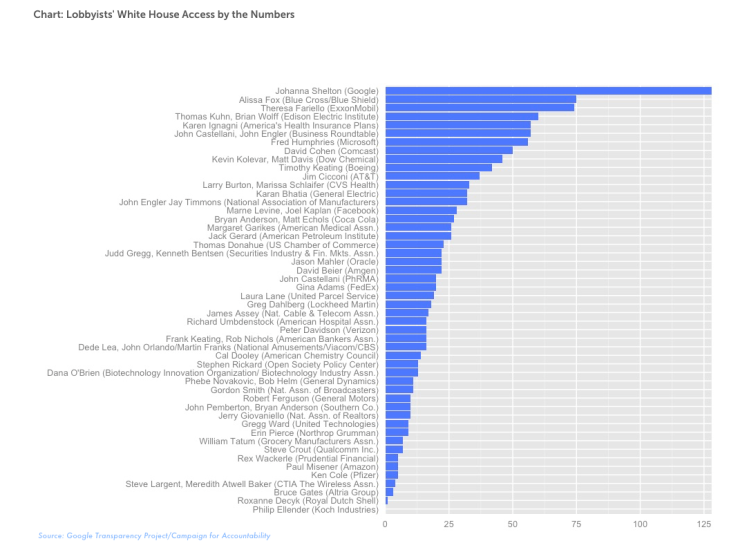One of Google’s worst policy nightmares is that state attorneys general will wake up to their obligation under state laws to protect both consumers and advertisers from Google’s overreach. This would potentially force Google to answer for its actions in 51 jurisdictions–some state laws that are essentially common to all 50 states plus the federal government. These state laws include consumer protection statutes and unfair competition or state antitrust rules that are not overriden (or “preempted”) by simultaneous federal jurisdiction.
In case you missed it, this kind of action is unlikely to happen in the typical states where that you would expect to see on the side of the little guy–California and New York, for example–due to Google’s outsized lobbying footprint. And of course Google famously got a free pass from the federal government during the Obama Administration where it enjoyed extraordinary access, reminiscent of Standard Oil, United Fruit and ITT.

However–it looks like the chickens are coming home to roost, at least in Missouri. According to the Kansas City Star:
Missouri Attorney General Josh Hawley’s office on Monday issued a subpoena to Google as part of an investigation into whether the tech giant is violating Missouri’s consumer protection and anti-trust laws.
The investigation delves into Google’s collection of data on users and whether Google, the world’s most popular search engine, has manipulated search results at the expense of competitors, according to a release from Hawley’s office.
“When a company has access to as much consumer information as Google does, it’s my duty to ensure they are using it appropriately,” said Hawley, a Republican who is mounting a campaign for U.S. Senate. “I will not let Missouri consumers and businesses be exploited by industry giants”…
Hawley’s investigation also will look at whether Google has misappropriated content from competitors. Yelp wrote a letter to the Federal Trade Commission in September contending that Google has violated a 2012 settlement by allegedly scraping photos from Yelp reviews for its own search results.
Although the Missouri AG seems focused on the privacy aspects of consumer protection, it is also possible that consumer protection statutes may protect advertisers against Google’s sale of advertising against ISIS recruitment videos or sites selling illegal drugs or pirated content. (Remember that Google paid a $500,000,000 fine under a 2011 non prosecution agreement–even though the then-U.S. Attorney General apologized to the company for the prosecution.)
As General Hawley noted in his press release:
On the state level, Attorney General Hawley is leading the way, holding tech companies such as Google accountable for their actions. However, this is not the first-time Google’s business practices have come into question. In June, the European Union issued Google a record $2.7 billion antitrust fine. Then, in July, the Electronic Privacy Information Center filed a complaint with the Federal Trade Commission regarding a Google program that tracks consumer behavior.
He’s right about that. In fact, Google’s many, many collisions with the law were recently cited in the first civil RICO complaint filed against the company, an avenue that may also be open to Missourians.
How will Google react? We should all remember the full-court press that Google and the Shills put on Mississippi Attorney General Jim Hood who also served a subpoena on Google for comparable issues that could have led to a violation of Mississippi’s consumer protection statutes. In that case, Google heavily leveraged support Hood allegedly received from lobbyists that was disclosed in the “North Korea hack” of Sony Pictures–which resulted in disclosure of many thousands of emails from Sony by Wikileaks (but, if memory serves, fewer than five to or from Sony and Google).

Google sued Hood to avoid responding to the subpoena, a case that attracted an amicus brief signed by forty–count ’em–state attorneys general supporting an attorney general’s duty to protect their citizens. Although Google was able to dodge General Hood, it was only a matter of time before another AG took on the Leviathan of Mountain View.
Even so, General Hawley needs to buckle his chin strap.


You must be logged in to post a comment.